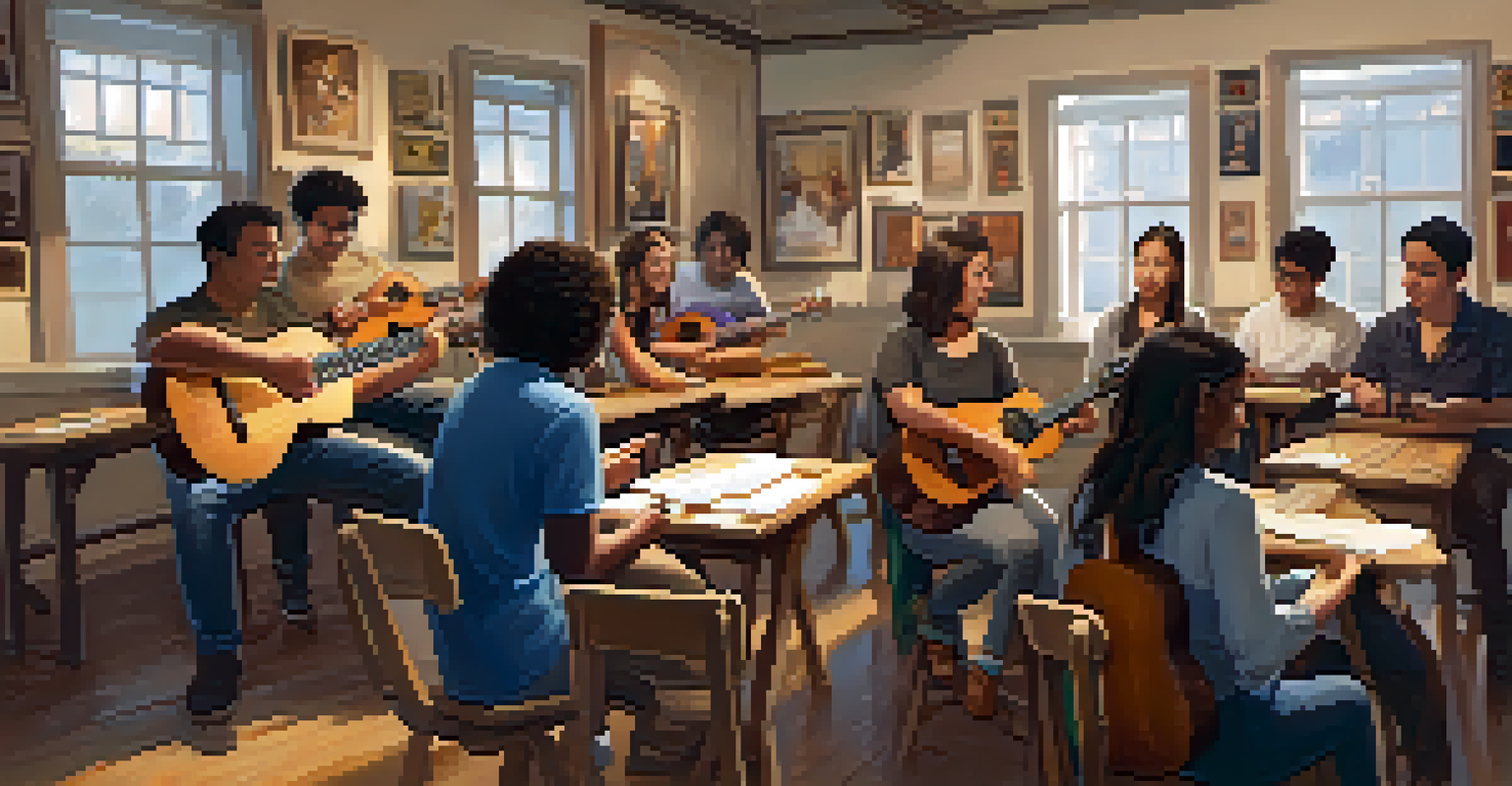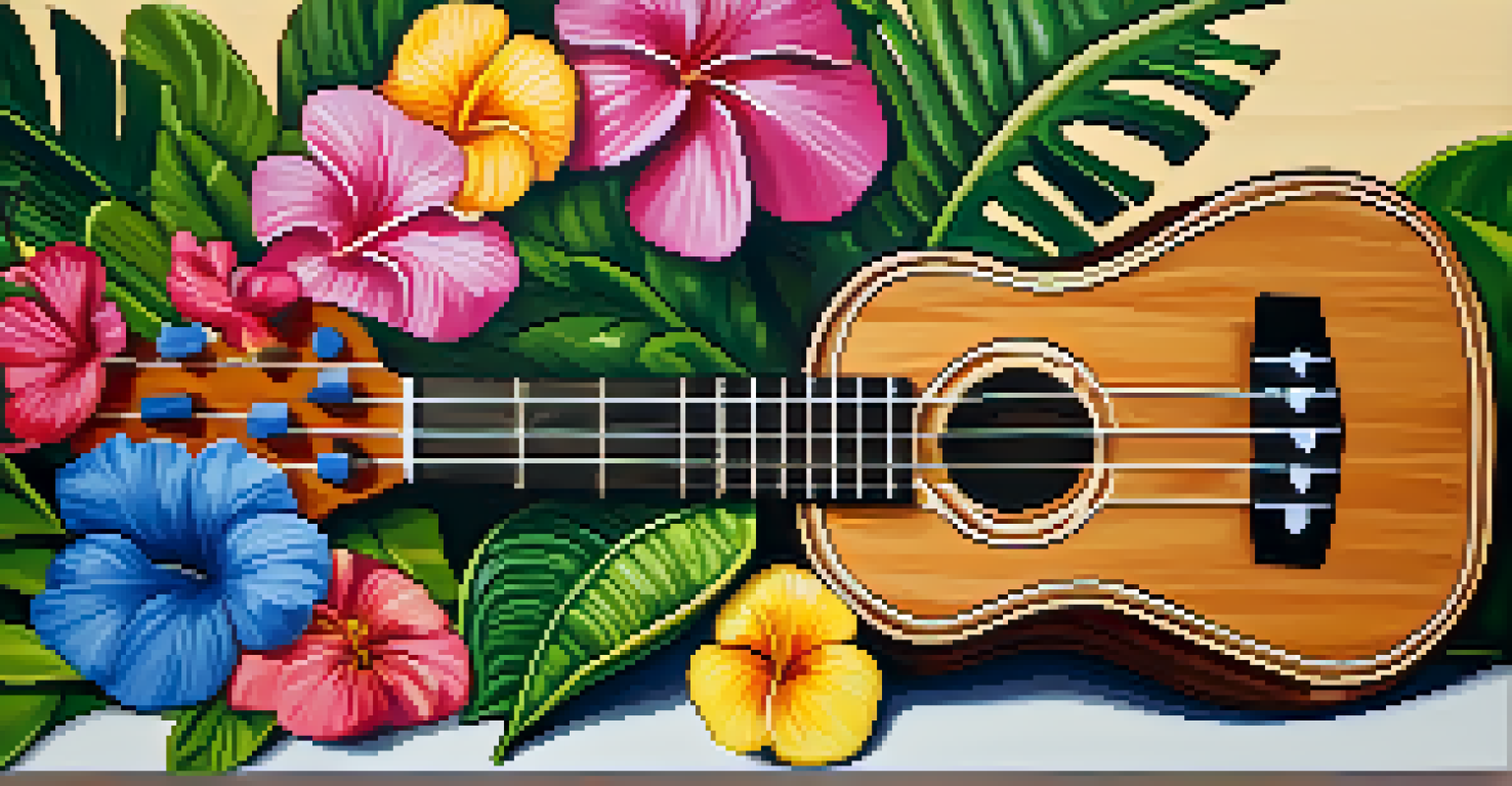The History and Evolution of Ukulele Festivals Worldwide

The Roots of the Ukulele: A Brief Overview
The ukulele, often affectionately dubbed the 'uke', traces its roots back to the late 19th century in Hawaii. Originally derived from the Portuguese machete, it quickly became a beloved instrument among locals and visitors alike. This small, four-stringed instrument is known for its cheerful sound, which has captured the hearts of many.
The ukulele is the instrument that brings people together, creating a sense of community and joy through music.
As the ukulele gained popularity, it began to spread beyond Hawaii's shores. By the early 20th century, it found its way into American music culture, especially with the rise of jazz and folk music. Its lighthearted vibe made it a staple in many musical circles, paving the way for its inclusion in various music festivals.
The ukulele's infectious charm set the stage for the creation of festivals dedicated to celebrating its music and community. As more people embraced the instrument, it became clear that a gathering of ukulele enthusiasts was not just about music— it was about connection and shared joy.
The First Ukulele Festivals: Pioneering Events
The first dedicated ukulele festival is often credited to the 'Hawaiian Ukulele Festival' held in the 1970s. This event celebrated Hawaiian culture and music, showcasing the ukulele's central role in traditional Hawaiian performances. It attracted enthusiasts and performers alike, fostering a sense of community among ukulele lovers.

Following its success, similar events began sprouting up around the world. Festivals like the 'San Francisco Ukulele Festival' and 'Uke Fest' in various regions helped to popularize the instrument further. These early festivals not only featured performances but also workshops, allowing participants to learn and grow their skills.
Ukulele Festivals Foster Community
Ukulele festivals are not just about music; they create a sense of belonging and connection among enthusiasts from diverse backgrounds.
These pioneering events set a precedent for future festivals, highlighting the importance of community engagement and education. They laid the groundwork for what would become a global movement, uniting ukulele players and fans from diverse backgrounds.
The Rise of Ukulele Festivals in the 21st Century
As the 21st century rolled in, the ukulele experienced a significant resurgence in popularity. With the rise of social media and platforms like YouTube, more people began to discover the instrument and its joyful sound. This increased interest led to a boom in ukulele festivals across the globe.
Music is a universal language that speaks to the heart, and the ukulele is a delightful way to express that language.
New festivals emerged in countries like the UK, Canada, and Australia, reflecting a worldwide appreciation for this humble instrument. Events like the 'UK Ukulele Festival' and 'Canadian Ukulele Festival' welcomed not just local musicians but also international acts, creating a vibrant melting pot of styles and influences.
These festivals became more than just music events; they evolved into cultural celebrations that highlighted the ukulele's unique charm. They brought together musicians, educators, and fans, fostering a sense of belonging and shared passion that transcended borders.
Notable Ukulele Festivals Around the World
Several ukulele festivals have gained international acclaim, attracting thousands of attendees each year. One of the most notable is the 'Maui Ukulele Festival' in Hawaii, which celebrates the island's rich musical heritage. This festival features top artists and offers workshops, making it a must-visit for any ukulele enthusiast.
In the UK, the 'Great British Ukulele Festival' draws crowds with its eclectic lineup and lively atmosphere. It provides a platform for both amateur and professional players, showcasing a wide range of musical styles. Such festivals create a sense of camaraderie among participants, who share tips and tricks and celebrate their love for the instrument.
Workshops Enhance Learning Experience
Educational workshops at ukulele festivals provide valuable opportunities for attendees to improve their skills and learn from experienced instructors.
These prominent events not only highlight the talents of performers but also serve as a reminder of the ukulele's global reach. They connect people from various cultures and backgrounds, united by their appreciation for this delightful instrument.
The Role of Workshops and Education in Festivals
One of the standout features of ukulele festivals is the emphasis on workshops and educational sessions. These opportunities allow attendees to learn from skilled instructors, regardless of their skill level. From beginner classes to advanced techniques, there’s something for everyone.
Workshops often cover various aspects of playing the ukulele, including strumming patterns, songwriting, and even music theory. Participants can engage in hands-on learning, gaining practical skills that they can take home. This focus on education contributes to the growth of the ukulele community.
Moreover, these workshops foster a supportive environment where players can connect and share their experiences. This sense of learning together enhances the festival experience, making it not just about music, but about building lasting friendships and networks.
The Cultural Impact of Ukulele Festivals
Ukulele festivals play a significant role in promoting cultural exchange. Musicians from different backgrounds often come together to share their unique styles and traditions, enriching the festival experience. This blending of cultures not only broadens musical horizons but also fosters understanding and appreciation among attendees.
Additionally, many festivals incorporate elements of local culture, showcasing regional music, food, and art. This integration of local traditions helps preserve cultural heritage while also attracting a diverse audience. Festival-goers often leave with a deeper appreciation for the local community and its artistic contributions.
Cultural Exchange Through Music
Ukulele festivals promote cultural exchange by bringing together musicians from various backgrounds, enriching the musical experience for participants.
The cultural impact of ukulele festivals extends beyond the music; they bring people together to celebrate creativity and diversity. By highlighting various musical influences, these events create a vibrant tapestry of sound that resonates with audiences worldwide.
The Future of Ukulele Festivals: Trends and Innovations
As we look to the future, ukulele festivals are likely to continue evolving in response to changing trends. Digital technology has already started to play a significant role, with virtual festivals gaining traction during the pandemic. This shift has made ukulele music more accessible, allowing people from around the world to participate.
Moreover, there's a growing trend towards incorporating sustainability and eco-friendly practices into festival planning. Organizers are increasingly mindful of their environmental impact, opting for green initiatives that promote a healthier planet. This commitment to sustainability resonates with attendees who value eco-conscious living.

The future of ukulele festivals looks bright, with a focus on inclusivity, innovation, and community. As more people discover the joy of playing the ukulele, these festivals will continue to flourish, celebrating the instrument's timeless charm and the connections it fosters among people.